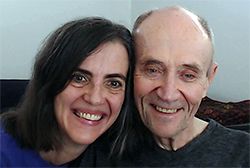Just One Look Forum Archives
Using the Just One Look Method
I''m confused as to how I relate to Just One Look. I know that it has proved extraordinarily useful to many; and it has also been for me. Furthermore, John has helped me to free myself from much of the preconditions and elaborations of what I now often call the fundamental, as I first tuned into that long ago from reading a bit about Zen and a book of the words of ancient Zen masters. Much later in a similar way, after dissociating myself personally from a lot of the Tibetan Buddhist teachings (which quite clearly were what in Buddhism is called provisional, though when I taught such in the context of the fundamental they seemed very valuable to students), I came upon some Dzogchen words of Longchenpa and others and found again a direct access to the fundamental.
So although I find John's direction worthwhile and worth supporting, as I do, it discomforts me considerably that John— despite occasionally somewhat moderating his basic thrust —pretty much claims that his direction (instruction, suggestion, invitation) is the one and only way to free oneself to live a real life. For some this may be so; I''m pretty sure it is not for all. Some do need provisional stuff of just the right sort for them. Some do need psychological help. Some, including the ones just mentioned, often run into the fundamental through other ways than John''s, including Zen, Dzogchen and various mystical or non-dual invitations.
I know John says that others who have stumbled on the actuality of their own nature don''t know how they did so. Nor actually did John for some time, as I connected with him prior to his more exclusive way that, as he says, he came upon in conversation with others. To me, and I have contemplated and thought about this for a long time, there just simply is not one and only one way. Various roads lead to Rome, and no one has definitively defined the fundamental or natural state. Even Ramana is said to (and I believe it so) have had a second self-annihilating experience, which actually made him much more human. So even John, and hopefully I, might evolve further—either in a fundamental way or in our understanding and method of communicating what's urgently important to others.
With respect and love,
Richard
Dear Richard,
John addressed this issue at the Worldwide Online Meeting on May 12, 2013. Actually, John is preparing a talk for the next Worldwide Online Meeting on June 16 in which he intends to address the same issues you raise here, but in a more structured format. The title is "Is the looking spiritual?"
Carla
Exclusivity
"pretty much claims that his direction (instruction, suggestion, invitation) is the one and only way to free oneself to live a real life." Actually not so. He said it is the simplest way. So in the midst of grappling with that suggestion and continuing to do whatever you are doing, John simply suggests to take a look at yourself.
Richard,
I am responding to the title of your post, and to it's relationship to the content. I have found that it is the case that natural experience that is revealed after the looking is one of inclusivity. All that exists and has ever existed is accepted and seen to be relevant and useful. Sometimes this usefulness is that what exists provides contrast or distinguishes itself from what is different, not the same, albeit related. All of what is deemed spiritual according to popular definition is considered that which is non physical, and often related to religion. This word, just like the word enlightenment is loaded with many meanings depending on the person who hears it. Although there are many things that one might experience and see clearly that are spoken of in spiritual teachings after the looking has done its work, that does not support the conclusion that the act of looking is spiritual. It is not a religious act or practice, nor does it involve any distinction between that which is physical or non physical. What in my view makes the looking such a beautifully simple and powerful action is that it does not need to be understood in any context, spiritual or otherwise. My perception is that human beings and human life are not spiritual, in fact they are not conceptual (and yes we are subject to the use of concepts to speak of that which is not conceptual).
It is a mental habit and part of the system of survival given by the context of fear to automatically make connections to what appears to be like the looking given the minds interest in understanding what appears before it. Nothing wrong with that, nor is there anything wrong with any of the spiritual traditions or teachings, in fact as John points out, they are very beautiful, and clearly have been helpful to humanity, however the suggestion to look at yourself and the resulting departure of neurotic fear is nothing other than what it is, that is it exists in its own paradigm, it is simple, direct, and does not require understanding or a context to be understood whether it be spiritual, psychological, philosophical, etc. When people speak of the results of the looking they often talk about enjoying life, and experiencing all of the wonder, fury, and challenges of life with a sense of abandon that is free of neurotic fear....these are simple expressions of the joy and delight of living a human life....not about bliss states, visions, or any of the other passing phenomena that can be experienced if one practices emersion into the "inner world", whatever that is.
I hope this is helpful.
David
Wow, David. This is an amazing reply and so resonant with where I am right now. I still have one quiet, slippered foot in the spiritual world, but this conditioning is evaporating by the day. I need to read this a few more times.....I like what you say about concepts. I am feeling the momentum of my conditioning against the fear, I find myself doing things without knowing why and with no impetus or juice other than it's "mechanical". But there are no longer conceptual formulations to reinforce, define, comment on these behaviors that just emerge. There is a dryness to life in this process......a plainness. The fear is no longer there, but there is a gap between me and my life. When I do something spontaneous, unexpected or unconditioned this gap closes a bit, but there is not some fluid living free of conditioning. It feels that I am living conceptually much of the time but my heart isn't in it.....this is really hard to articulate!
I work in a school and have time off in the summer. I always notice then when I drive somewhere after a week or 2 off, to do an errand or whatever, I am driving much slower and am relaxed about it. I enjoy the ride, even the impatience of others behind me! It's such a different experience. Now I feel like more of my life is just summer driving.....without the concepts of the future pulling me forward out of the enjoyment of just driving.
See you down the road!
I want to thank all of you who have responded to my confusion. I will try to share more of my actual experience when I can.
Richard
I'm not sure this contributes much to the discussion, but here's what I observe.
1. Spirituality (or each particular discipline in the category) can be seen as an attempt to find an answer or solution to the fundamental problem of suffering. This is how I experienced it, when interested in Krishnamurti and later Tolle. It gives you various feelings and experiences as well, such as awe, reverence, clarity, humbleness etc. which might be reasons for the practice as well, but fundamentally they are a means to an end, the end being the end of suffering.
2. There's a tradition in believing that this solution is very very simple, when seen. In this sense John's message reminds me of becoming born-again Christian rather than wisdom teachings; Just the act of accepting salvation is enough. I think the simplicity is what they're after in Zen, too.
3. The enlightenment, or the end of suffering, is widely misunderstood as detachment from life, or a perpetual blissful state. In John's view, this is seen as actually going to sleep, escaping from life. This is because everything we perceive is mired in fear, therefore there must be something different. But if fear is gone, everything IS different.
4. The persons who we see clearly as "enlightened" might have done what John describes without knowing it. We can't really know. What clearly seems to be the case is that the paths they lay before us are quite obscure, difficult, arduous or downright impossible for ordinary mortals. So there's no simple solution for them. At least, they can't articulate it. Whereas John can. It's simple as can be, and then some more. What's outrageous about it is it's simplicity. We've been taught that if something seems too good to be true, it isn't, but there's nothing to lose, since you're not required to study anything or replace your beliefs with new ones. All it takes is about ten minutes or so of your time and effort. Heck, there's an app for it! 
So, there are similarities to spiritual paths, but if a final solution is what we're after, there's no need to see it with that bunch. Especially given the obscurity and failure record they (seem) to have. If you have the solution, you don't need any path. Or rather, if you're free of suffering you don't need a solution anymore. Or even if you believe you are free (in my case. I can't be really sure, yet). These days, whenever I see people promoting this or that spiritual path, I feel kind of sad at the ignorance and the grappling of after what seems true and beautiful, if you don't know better. I can't really say how this is different from feeling of superiority that comes from believing to be right, but the whole issue seems so clear now. That said, I don't (yet) have the confidence of John. But it is inclusive in the sense that you see the beauty in the spiritual teachings, and where they come from, and you see what you believe they really mean and it makes perfect sense, but they don't seem to really get to the bottom of it.
Seppo

